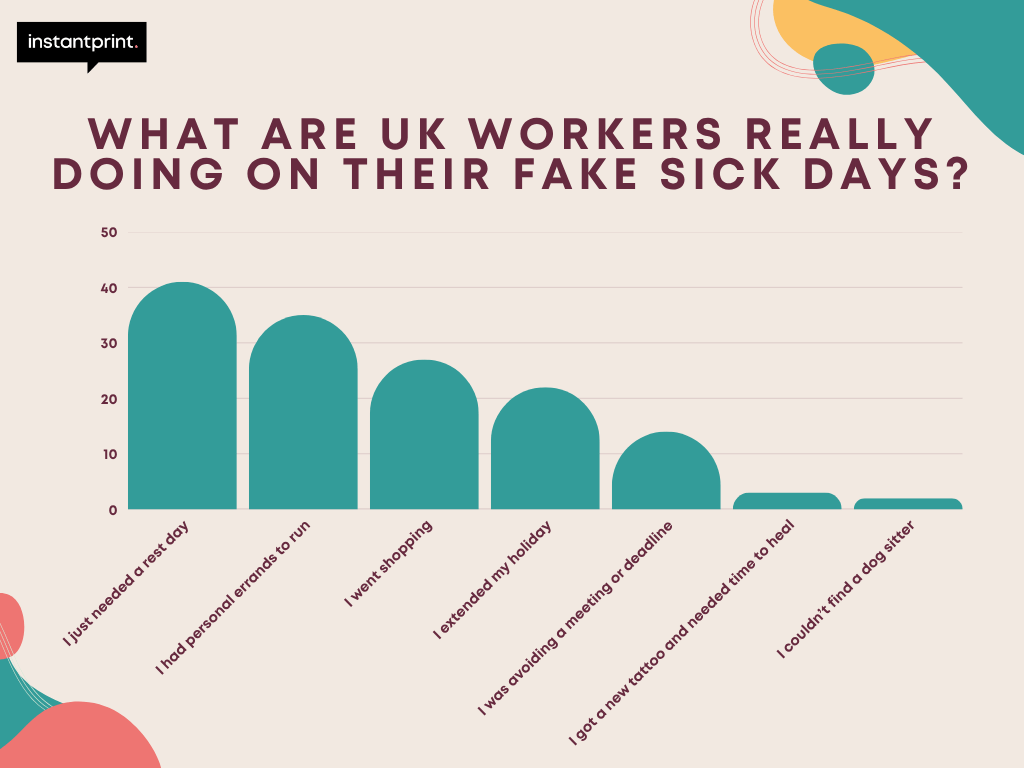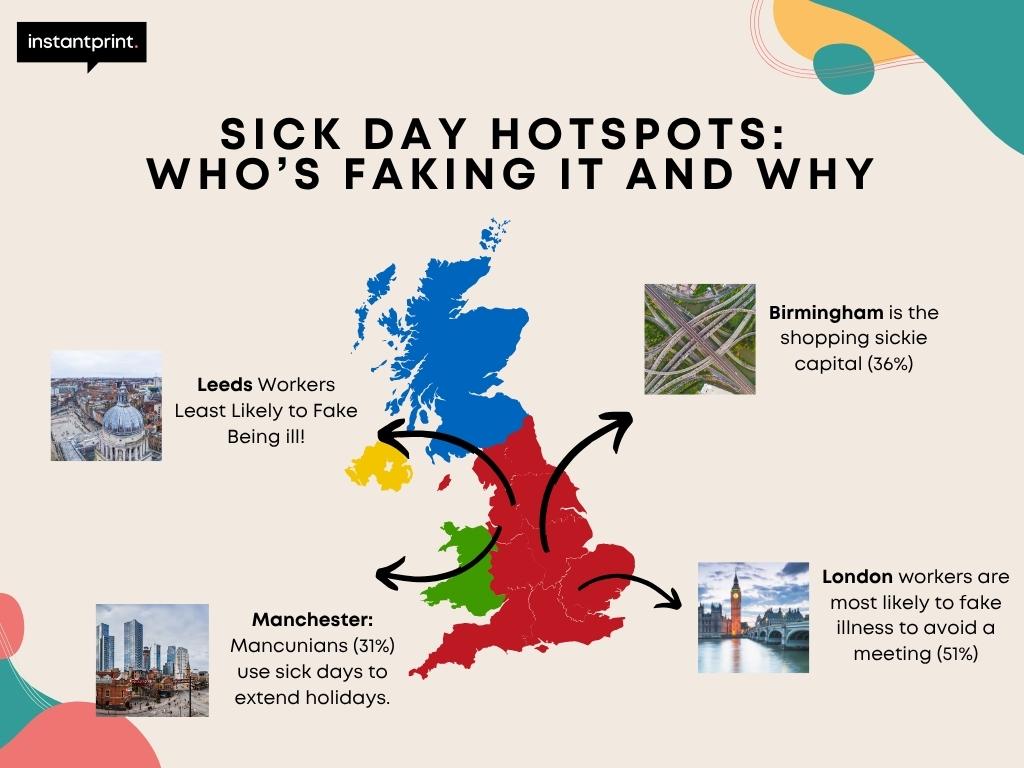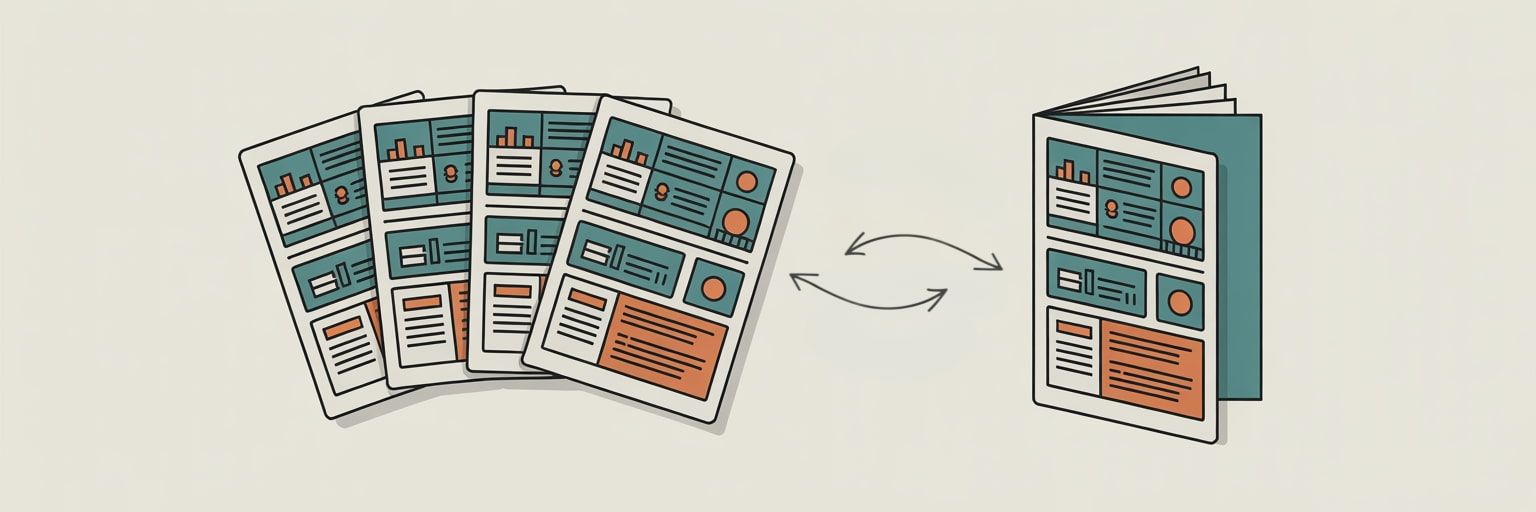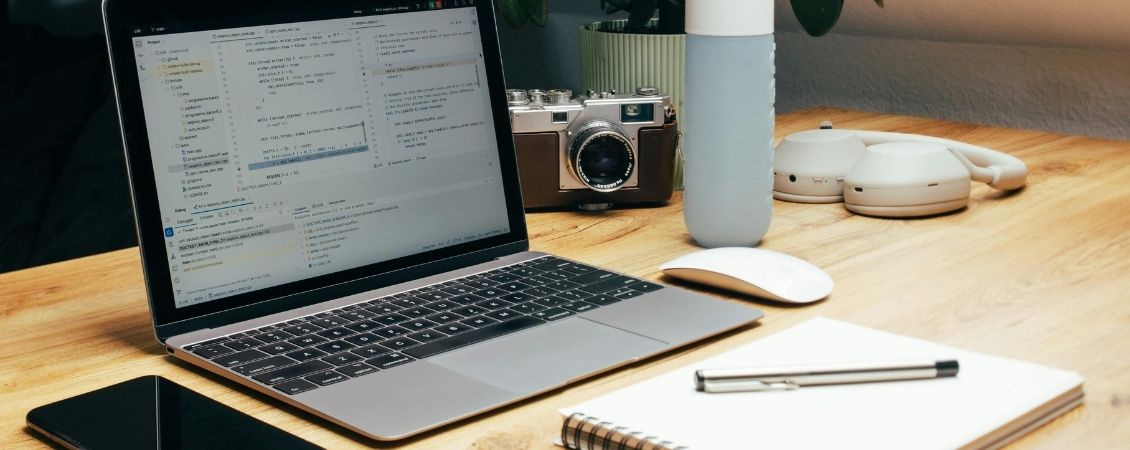Sick days used to mean tissues, thermometers and calling your mum. But in 2025, they’re just as likely to mean sneaky shopping trips, spontaneous long weekends or dodging that 3pm Zoom.
And it’s not just the occasional duvet day, fake sick leave is becoming a workplace norm. According to our latest instantprint survey of 2,000 UK workers, 68% have pulled at least one fake sick day in the past year. For 1 in 5 women, the reason was simple, retail therapy.
It sounds lighthearted but this trend points to deeper issues at play, burnout, stress and workplaces where people don’t feel safe to be honest about needing time off.
Why Fake Sick Days Could Be Draining Your Business, Even When No One’s Really Ill
Fake sick days aren’t disappearing, they’re evolving, and they’re costing your business more than you think.
Our instantprint survey of 1,000 UK workers shows 68% admitted to faking at least one sick day in the past year. Reasons range from avoiding meetings and deadlines to simply needing a mental health break.
Using national productivity data and absenteeism rates, we estimate that for a team of just 10 people, fake sick days and lost productivity could cost over £45,000 a year.
“These ‘sickies’ aren’t about skipping work, they’re often signs of stress, exhaustion and cultures that don’t support open conversations about time off. Employers need to adapt or face the consequences.”
— Vicki Russell, Head of TX at instantprint
What Are UK Workers Really Doing on Their Fake Sick Days?
Let’s cut to the chase. People aren’t always calling in sick because they’re ill. When we asked what really fuels their ‘sickies,’ here’s what they said:
- 41%: “I just needed a rest day”
- 35%: “I had personal errands to run”
- 27%: “I went shopping”
- 22%: “I extended my holiday”
- 14%: “I was avoiding a meeting or deadline”
- 3%: “I got a new tattoo and needed time to heal”
- 2%: “I couldn’t find a dog sitter”

Sick days have quietly become self care days or stress relief in disguise.
Too Ill to Work, or Just Too Tired to Pretend?
We’re living in the age of the functional sick day, where people log in from bed, answer emails in their dressing gowns and feel guilty for switching off. The pressure to push through is real:
- 63% of UK workers say they work through illness out of guilt
- 44% feel judged or pressured not to take sick leave
- 1 in 5 will only take a sick day if they physically can’t get out of bed
The result, more burnout, more disengagement and more fake sick days that could have been avoided with honest conversations.
Sick Day Hotspots: Who’s Faking It and Why
- Birmingham: Retail therapy capital, 36% have called in sick to go shopping
- Manchester: Holiday stretchers, 31% admit to using sick days to extend breaks
- London: Meeting dodgers, a whopping 51% faked illness to avoid a work commitment
- Leeds: Least likely to fake, topping the honesty leaderboard
- Brighton: Most open about mental health, with the highest self-reported mental health absences

Men vs Women: A Sick Day Gender Split
- 69% of women admit to faking sick days to go shopping, nearly three times more than men
- Men are more likely to cite stress or avoiding confrontation
- Women are twice as likely to say they needed the day for mental wellbeing
These findings point to a bigger issue, fake sick days aren’t about slacking off, they’re acts of self preservation in a system where rest still feels like rebellion.
HR Expert Advice: How to Tackle Sickies Without Playing the Blame Game
“If someone doesn’t feel they can ask for a day off, the system is broken. People fake sick days when honesty isn’t welcome. Changing that starts with leadership.”
— Vicki Russell, Head of TX at instantprint
- Make Your Sick Leave Policy Clear and Shame Free
Sick leave should cover physical and mental health. Make it clear no one needs to fake it to take care of themselves. - Normalise Check-Ins Before Burnout Hits
Managers should regularly check in with their teams not to monitor, but to support. At instantprint, our Health and Wellbeing trainer Sean Kachmarki leads burnout training to help managers and team members recognise warning signs. We also provide a comprehensive wellbeing resource list. - Offer Flexible Time Off Options
A “personal day” policy gives people breathing room to rest, regroup or sort life admin without guilt. - Train Managers to Lead With Empathy
A culture of trust starts at the top. Empower leaders to listen, support and respond with understanding, not suspicion. - Utilise Industry Support Networks
instantprint benefits from the Printing Charity, offering mental health and wellbeing support. We recommend exploring similar support in your industry. - Support Employees Back Into Work With Compassion
instantprint takes a high-support approach to return-to-work. We use structured conversations focused on how the employee feels, what they need and what adjustments would help. We’ve also created a downloadable template to help other teams do the same.
Final Thoughts: If Staff Are Faking Sick Days, the Policy Isn’t Working
Fake sick days aren’t a productivity problem; they’re a culture problem.
People lie when honesty doesn’t feel safe. They take secret days off when open ones aren’t available. They push through burnout until it becomes unmanageable.
The good news? Fixing this isn’t about being stricter. It’s about being smarter. A workplace built on trust, empathy and flexibility doesn’t just reduce sickies, it boosts morale, loyalty and performance.
So next time someone calls in sick, ask less why and more, What do you need from us to feel okay coming back?

.jpg)



